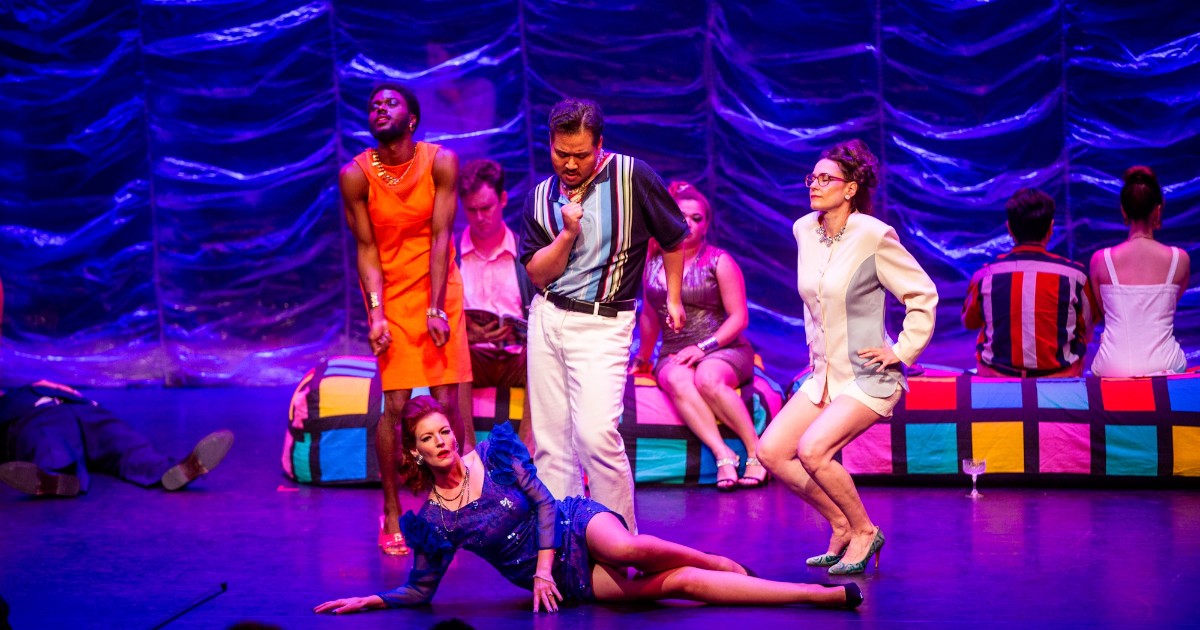OPERAWIRE
The ominous D minor chord that ushers in the overture of “Don Giovanni” speaks volumes. It is ominous, even supernatural, foreshadowing that this is not one of Mozart’s more lighthearted sex comedies. Though Da Ponte infuses the opera with plenty of humor, there is no escaping the darkness that kicks off the drama giocoso.
Interestingly, Mozart also set his Requiem in the same key, and Beethoven used it for his Symphony No. 9. In these instances, the key plays a metaphysical role, and given the supernatural finale of “Don Giovanni,” it does so, as well.
Maestro Jason Tramm tapped into that power as he led the Midalantic Chamber Orchestra in Teatro Grattacielo’s production of Mozart’s masterpiece on June 16, 2023, at The Riverside Theatre in New York.
Tramm brought out a bold sound with his 11-piece band. He held back the orchestra during the overture, taking it at a much slower pace than is typical. This he used as an engine to gain the momentum needed to drive the story forward. When it came time to play fast, it was more impactful. The motif introduced in the overture can be heard throughout the score, foreshadowing what’s to come. Tramm seemed to pick up on this. Under his baton, the motif became a character.
Welcome to the 1990s
Teatro Grattacielo’s unique interpretation set the story in 1990s Spain. Onstage were inflatable couches, a bar, and various women referred to as “actresses” in the program; this coterie included a drag performer named Shanghai Lily. The set had a touch of Hugh Hefner’s mansion, with women lounging on couches and in seats in front of the stage. The actress on stage the most played at being bored out of her mind and, in doing so, became a living piece of furniture, moving here and there—mixing a drink, playing with a gun, and chomping on bubblegum. A small contingent of actors, along with Shanghai Lily, sat on stage right—with the audience and watched what unfolded onstage until it was their turn to take to the stage and dance and strut. The ‘actresses’ were both real-world actors and Don Giovanni’s pet women, blurring the lines between reality and giving the opera self-awareness.
The bulk of Tasos Protopsaltou’s consisted of a wall of bubble wrap. Along with providing lighting designer Matthew Deinhart an interesting canvas on which to do his magic, it also served as a window into happenings “offstage.” For instance, the audience could see Donna Anna running from Giovanni as if in a dream before her entrance proper. Much creepier was the ghostly appearance of Commendatore behind the bubbles, just standing there and watching before the finale.
Director Stefanos Koroneos added interstitial music, with the cast members listening and dancing along to La Lupe, an American-Cuban bolero singer who died in 1992. While the transition from Mozart to La Lupe was jarring, it was a creative reminder of the Spanish setting.
What was a little less clear was where the action was taking place on a micro-level. After Don Giovanni viciously stabs the Commendatore, the corpse remains onstage. However, the exact location of the murder was difficult to discern because of the absence of set changes throughout the opera. Whether they were in the square, a club, Don Giovanni’s mansion, or some other place remained ambiguous. There was little to criticize in Koroneos’ direction. He took bold moves, and they paid off. With Commendatore’s lifeless body on stage, it became part of the farce, with characters needing to step over Commendatore’s corpse. The onstage actress even rifles through his pockets and steals his wallet.
Don Giovanni: Violent Sociopath
The cast for the premiere performance featured Suchan Kim as Don Giovanni, Andrew Dwan as Leporello, Rick Agster as Commendatore, Sara Kennedy as Donna Anna, Pedro Barrera as Don Ottavio, Eun Byoul Song as Donna Elvira, Luna Seongeun Park as Zerlina, Minki Hong as Masetto. Omar Howard was Miss Shanghai Lily, and Natasha Scheuble and Liz Klien as the Actresses.
OperaWire last reviewed Kim in January 2023 for his performance in librettist Philip Kan Gotanda’s and composer Max Giteck Duykers’ powerful chamber opera “Both Eyes Open.” In that opera, Kim portrayed Jinzo, a Nisei man interred at during World War Two. Jinzo was no Don Giovanni; rather, he was a broken man, so ashamed of his behavior that he commits suicide.
Kim demonstrated his versatility as a singer-actor and created a Don Giovanni that was a bit off-kilter, almost maniacal. At one point, in a scene seemingly ripped from a Tarantino film, he places a gun to Leporello’s head, terrorizing his poor servant. Giovanni laughs the whole thing off and tosses the gun away (which is then stolen by the onstage Actress). It was a bonkers moment that came out of nowhere and put the audience on the edge of their seats. While unexpected, it showed his character as someone who is quick to demonstrate his power to get his way, whether with Leporello or the women. But it also showed Giovanni as a quintessential sociopath. He raped a woman, killed her father, and moved on, with zero empathy for the destruction left in his wake.
During Act two, Kim’s Don Giovanni broods in a chair, his arms across his chest, and with a withering stare. His lack of success with Zerlina turned him into a petulant man-child.
Kim’s lyricism was on display as he took on his lines with clean articulation through the speedier recitatives and fast passages, which aided in bringing out the unstable and violent aspects of the character. His rendition of ‘Fin ch’han dal vin, A.K.A. the Champagne aria” was well sung with buoyancy in his voice.
With Giovanni’s famous serenade, “Deh, vieni alla finestra,” Kim showcased the sense of charm and seduction in his voice, adeptly conveying the character’s intentions. He used and maintained control of dynamics, adding to the seductive quality of the piece.
The final scene, perhaps one of the most dramatically intense scenes in opera, was brilliantly performed by Kim. The brooding Giovanni morphed into pure defiance; in his mind no one is as strong and ‘manly’ as he, not even a statue, come to life. But his mocking insolence turns into terror, requiring a quick switch in tone and delivery.
Few Could Ask for a Better Sidekick
Is it any wonder why the servant wants to run away from such a toxic and violent employer? Dwan had a good night navigating the push and pull of Giovanni’s magnetism; Leporello loved to hate him. The master-servant relationship took a homoerotic turn, with Giovanni approaching Leporello, coaxing him to stay on as his servant. Giovanni slinked toward Leporello until they were nose to nose; it was the perfect setup for a passionate kiss, but it doesn’t happen. Giovanni shoves Leporello backward, laughing, as he reasserted his dominance. Both Dwan and Kim played it perfectly.
Dwan has a voice that carries a deep richness that would serve him well in the title role, should he sing it. Leporellos and Giovannis do often switch. The bass-baritone incorporated elements of comedy and character into his voice—a must—varying his vocal tone, inflection, and timing to deliver humorous lines and situations. His lines were clear with excellent diction, using it to deliver the rapidly changing notes and rhythms in his “Catalog Aria.”
A Strong Donna Anna
Sara Kennedy, in the role of Donna Anna, portrayed a powerful and resolute woman seeking revenge, unafraid of the rake. Her bright soprano voice sounded excellent, with a powerful upper register. Among all the singers on stage, she demonstrated the greatest raw strength. However, her vocal force could have benefitted from a touch more nuance in her use of dynamics to add depth to her performance.
The ability to sing softly yet still intensely is an important quality for Donna Anna, which leads back to the power Kennedy exhibited throughout her performance. There are moments of vulnerability that require gentler, more introspective singing. Nevertheless, her strong portrayal of Donna Anna clashing with Don Giovanni provided a counterforce, showcasing her resilience and determination even while grieving for her father and repelling Giovanni.
Kennedy’s arias, “Or sai chi l’onore” and “Non mi dir,” called for strong high notes and the ability to maintain control and tone quality in the lower register, both of which she executed quite well. All-in-all, she was an exciting singer with a killer voice.
Performances
Eun Byoul Song, as Donna Elvira, had the range, strength, and agility needed to deliver her often confrontational lines. Song also showed strong dramatic interpretation as she moved through Elvira’s varied emotional states, from fury to love, among other intense emotional swings, raging anger in ‘Ah fuggi il traditor.’ Often, the character is portrayed as a woman driven solely by her emotions. Song fleshed out the character, making Donna Elvira three-dimensional.
Pedro Barrera, in the role of Don Ottavio, sang a beautifully lyrical’Dalla sua pace,’ showcasing Ottavio’s sensitivity and depth of feeling. In many productions, Ottavio often comes across as weak. And it’s questionable whether Donna Anna loves him. Not so in Koroneos’ production. Both expressed tenderness and love. One didn’t get the feeling that she found Giovanni more exciting than her fiance. She seemed genuinely happy about the arrangement.
Minki Hong’s Masetto did very well in his ensemble work and interactions with Zerlina and Giovanni. In ‘Ho capito, signor sì,’ his expression of irony and sense of being wronged came through.
As for Zerlina, Luna Seongeun Park had spark. She presented “Batti, batti” as more of a challenge than anything else, daring Masetto to hit her.
As for Commendatore, Rick Agster deserves significant commendation for lying flat on his back on an unforgiving stage for much of Act one. For the finale, Koroneos had the character break the fourth wall and emerge from the audience, an interesting touch and much more engaging than having him enter from the wings. A deeper, more menacing voice and confidence in the lower range lacked a bit, blunting some of the dramatic edges to the scene. Kim’s Giovanni needed a terrifying Commendatore for balance.
No Fire and Brimstone
Koroneos did not have the Commendatore pull Giovanni into a flaming Hell; instead, he opted for poison as the means of the character’s destruction. If the staging were more traditional, this would be difficult to overlook, but the more modern interpretation lent itself to a different death. Perhaps Commendatore poisoned Giovanni with the toxic brew already present within Kim’s interpretation, activating it and turning it against him.
Koroneos took chances with Grattacielo production. It was as unsettling as it was zany. Koroneos kept the audience guessing. When the actress plays with Don Giovanni’s pistol, will she accidentally shoot herself? Anything was possible in this intriguing production.
Chris Ruel








